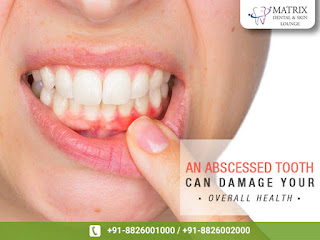Teeth Discoloration: Cause, Symptoms, And Prevention
Your teeth may become darker, change color from white to another shade, or form white or black patches. Tooth discoloration can be caused by several illnesses that affect dentin, the substance that lies beneath the enamel (the hard surface of the teeth), and the enamel itself. The color of teeth might also be impacted by some disorders' treatments. For instance, chemotherapy and radiation to the head and neck might discolor teeth. Tooth discoloration has many causes, including Foods/drinks. Your teeth can become stained by coffee, tea, colas, wines, and some fruits and vegetables (including apples and potatoes). Matrix Dental Clinic in South Delhi would be an advisable place to visit for the best advice and treatment.
There are several causes of tooth
discoloration;-
Extrinsic, which means that something that comes into contact with your teeth is to blame
Intrinsic, which means it's brought on by
anything inside your body or teeth
older age; occurring later in life
Causes of Tooth Discoloration
Tooth discoloration has several causes, including:
● Dental hygiene issues: Not cleaning your teeth well enough to get rid of stains and
plaque.
● Dental supplies: Some dental materials, particularly those containing silver sulfide,
like amalgam restorations, can give teeth a grayish-black tint.
● Aging: Your
teeth's outer coating of enamel wears away as you age, exposing the dentin's
original shade.
● Genetics: Some
people naturally have enamel that is brighter or thicker than others.
● Environment:
Too much fluoride can stain teeth, whether it comes from the environment
(naturally high fluoride levels in water) or misuse (fluoride treatments,
rinses, toothpaste, and oral fluoride supplements).
● Trauma: For instance, injury from a fall might impede the development of enamel in young infants whose teeth are still forming. Adult teeth may become discolored as a result of trauma.
Color is a factor in tooth discoloration
● Brown - Teeth may turn brown as a result of tobacco
usage, dark liquids like tea or coffee, and careless brushing techniques that
promote tooth decay.
● White - Too much fluoride can produce white patches on developing teeth. Fluorosis is a condition that develops when teeth are exposed to excessive amounts of fluoride through toothpaste, rinses, or drinking water.
Preventing tooth discoloration
Make sure that you brush your teeth after having stain causing food. Some stain-causing agents to be aware of are:
● Java or tea
● Soda
● White and red wine
● Cranberry or grape juice
● Blueberries
● Beets
● Sour cream
● Tomato ketchup
Treatments for Discolored Teeth
Depending on what caused the discoloration, there are several ways to treat it, including:
● Using dental hygiene methods like
flossing
● Avoiding stains-causing foods and
beverages
● Using whitening products available
over the counter. Your teeth may become more sensitive as a result, although
this side effect normally goes away after the bleaching process is over.
Consult your dentist if your gums become irritated.
● Chemicals for at-home whitening that
you can buy from your dentist
● Office-based whitening treatments. If
you get your teeth whitened in the dentist's office, it can take a single visit
or more. Before applying a bleaching solution to your teeth, they will cover
your gums with a gel or rubber screen for protection. They can also create a
tray that is specially designed for you to use with whitening gel at home.



Comments
Post a Comment